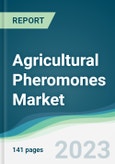The global agricultural pheromones market is projected to grow at a CAGR of 15.81% to reach US$8.951 billion in 2028 from US$3.204 billion in 2021.
Agricultural pheromones are natural semiochemical compounds emitted by insects to communicate with each other. They are now being utilized as a sustainable and environmentally friendly alternative to conventional pest control methods in agriculture. Agricultural pheromones offer a highly targeted and species-specific approach to pest management. By mimicking the pheromones emitted by insects, farmers can disrupt the mating behavior of pests, preventing reproduction and reducing pest populations without harming beneficial organisms or the environment. This targeted approach minimizes broad-spectrum insecticides and reduces the risk of developing pesticide resistance in pests, contributing to sustainable agricultural practices.The agricultural pheromones market is primarily driven by the increasing adoption of integrated pest management practices and growing demand for sustainable crop protection techniques. Moreover, rising government support for adopting sustainable pest control methods and increasing demand for enhancing crop yield and quality is also propelling the global market expansion during the projection period.
Despite the promising potential of Agricultural pheromones, the market faces a few challenges, such as limited availability of specific pheromone formulations for certain pests, higher upfront costs compared to conventional pesticides, and the need for precise timing and application techniques. However, with ongoing research and development efforts, increasing awareness among farmers, and support from regulatory bodies, the agricultural pheromones market is expected to overcome these hurdles and witness continued growth in the coming years.
The growing adoption of integrated pest management and sustainable pest control methods is driving the global agricultural pheromones market.
According to estimates published in 2021 by the Food and Agriculture Organisation, insect infestation causes the loss of 40 percent of global crop production each year. Plant diseases cost the world economy more than US$220 billion yearly, and invading insects cost at least US$70 billion. Agricultural pheromones offer a highly targeted and species-specific approach to pest management. By mimicking the pheromones emitted by insects, farmers can disrupt the mating behavior of pests, preventing reproduction and reducing pest populations without harming beneficial organisms or the environment. This targeted approach minimizes broad-spectrum insecticides and reduces the risk of developing pesticide resistance in pests, contributing to sustainable agricultural practices.The increasing adoption of integrated pest management (IPM) strategies has been a key driver for the agricultural pheromones market. IPM focuses on comprehensive pest management by integrating multiple methods, including biological control, cultural practices, and targeted pesticide applications. Pheromones play a vital role in IPM by providing a non-toxic and environmentally friendly tool for pest monitoring, mass trapping, and mating disruption.
The North American region is anticipated to hold a significant share of the global agricultural pheromones market.
North American region will experience rapid expansion throughout the projection period due to the high awareness about the benefits of pheromones, the presence of many agricultural pests, and the favorable regulatory environment. This region's market is also expanding because of increasing concerns about the environmental impact of conventional pesticides and the growing adoption of IPM practices. Moreover, the presence of well-established agriculture and the shift towards organic farming practices are also spurring regional demand for agriculture hormones. Eighty-two percent of American farmers want to enhance the production of organic products, according to data from the US Department of Agriculture. The United States now has 1,558 certified organic farms, and 657 more will be approved in 2021. In addition, the prevalence of key market players such as Suterra LLC, Isca Technologies Inc., Trécé Inc., and others also spur the growth of agricultural pheromones in this region.Market Developments:
- In January 2023, Bayer and the French business M2i Group announced their collaboration to bring pheromone-based biological crop protection solutions to fruit and vegetable producers worldwide. By the agreement, Bayer will hold the sole distribution rights for a subset of M2i products that target lepidopteran pests in crops, including tomatoes, grapes, stone, and pome fruits.
- In June 2022, the largest US agribusiness, FMC, agreed to purchase BioPhero, a Danish firm that develops pheromone-based biocontrols for the crop-growing sector, for US$ 200 million. In addition to the BioPhero team joining FMC, the agreement covers the startup's technology, intellectual property, and supply arrangements.
- In May 2022, Syngenta Crop Protection and M2i, a top technology provider of pheromone-based crop protection solutions, introduced EXPLOYO Vit, a new pheromone-based product to assist French wine producers in efficiently managing damaging pests in vines that affect the quality and yield of grapes. The vine moth Lobesia botrana, which feeds on grapes and spreads the potentially fatal fungus botrytis that causes vines to rot, is one of the most destructive pests for wine farmers.
Market Segmentation:
By Type
- Sex Pheromones
- Aggregation Pheromones
- Repellent Pheromones
- Others
By Product Type
- Pest Control
- Others
By Species
- Moths
- Beetles and Bugs
- Armyworm
- Butterflies
- Others
By Crop Type
- Field crops
- Orchard Crops
- Fruits and Nuts
- Vegetables
- Others
By Function
- Detection and Monitoring
- Mating Disruption
- Mass Trapping
- Others
By Geography
- North America
- United States
- Canada
- Mexico
- South America
- Brazil
- Argentina
- Others
- Europe
- United Kingdom
- Germany
- France
- Spain
- Others
- Middle East and Africa
- Saudi Arabia
- UAE
- Israel
- Others
- Asia Pacific
- Japan
- China
- India
- South Korea
- Indonesia
- Thailand
- Others
Table of Contents
Companies Mentioned
- International Pheromone Systems Ltd (U.K.)
- Novagrica
- ATGC
- Pacific Biocontrol Corporation
- Pherobank
- Certis Europe
- SEDQ Healthy Crops S.L.
- Koppert
- Russell IPM Ltd
- The Wonderful Company LLC








